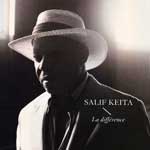The “difference” in the title track is Keita’s albinism, a subject that has always interwoven his biography, but never before entered his song lyrics. He discussed his decision to sing about albinism and the positive aspects of being “different” in an interview with Afropop shortly before the album’s release. The song itself is an instant classic, building confidently through melodic passages towards a quintessentially Salif Keita, life-affirming hook refrain. Once it enters your ears, it will not leave you, and you’ll be enriched for the experience. The sonic makeup of this track is impressive as well. The sound is layered and dense but remarkably uncluttered. Harouna Samake’s high hits on kamelengoni sound almost like a kora, a magical touch.
Samake also shines on a melodious solo on “Papa,” and the setup groove for “San Kan Na,” which like “Samigna,” channels the ceremonial serenity of Mande court music. Mehdi Haddab plays oud on a number of tracks, most notably the undulating, stately “Gaffou.” Balafon maestro Keletigui Diabaté sits in on “Djélé,” another elegant Mande song. There are three new versions of past Keita songs here, a bubbling remake of “Seydou,” and extremely understated new reads of “Papa” and “Folon,” both produced by veteran American producer Joe Henry. (The rest of the album was produced by Patrice Renson.) On “Folon,” Salif’s brooding ode to the past, guitarists Bill Frisell and Seb Martel and pianist Patrick Warren grace the mix with superbly tasteful, minimalist commentary.
The one really upbeat song on the CD, “Ekolo d’Amour” is fun, though a little pat and cute by comparison with the profound and introspective material that surrounds it. In his recent live show at Central Park Summerstage, Keita demonstrated that his band can still kick out the grooves on stage and get a crowd on its feet and in a frenzy. But in the studio, Keita is more interested in deepening and honing his expertise as one of the most serious and subtle song-crafters in African music. Keita’s most personal album to date is also one of his best in a long string of brilliant work.
-Banning Eyre









